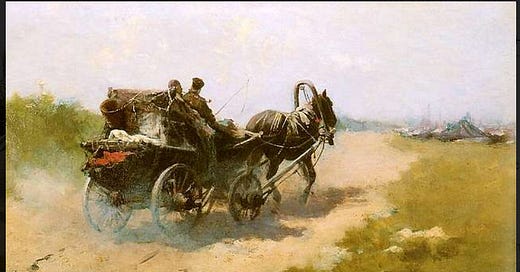When bad things happen and we don't know why...
Robert Frost's terse poem captures the feeling of sudden, brutal, inexplicable misfortune--and how frighteningly random it can be
With a lantern that wouldn’t burn In too frail a buggy we drove Behind too heavy a horse Through a pitch-dark limitless grove. And a man came out of the trees And took our horse by the head And reaching back to his ribs Deliberately stabbed him dead. The ponderous beast went down With a crack of a broken shaft. And the night drew through the trees In one long invidious draft. The most unquestioning pair That ever accepted fate And the least disposed to ascribe Any more than we had to to hate, We assumed that the man himself Or someone he had to obey Wanted us to get down And walk the rest of the way.
What we love about this poem…
It’s hard to ‘love’ such a harsh piece of writing, but it’s oddly moving. And it’s funny! The absurdity of the final line, that he ‘wanted them to walk,’ tickles us.
There’s so much we don’t know—who is this strange man, and why does he take such violent measures just to get the couple to walk? And why does the couple just carry on, barely flinching? Is this Fate? God? Anti-God? Is it about life’s randomness? No answers are given. Critics are still debating what it’s about. Frost himself said that it’s a poem that ‘nobody knows how to take.’
We love the way the first stanza sets a tone of foreboding. Writing with hindsight, the speaker recalls that things were slightly off: the lantern wouldn’t burn, the buggy was too frail, the horse too heavy. This subtle use of prolepsis—not just foreshadowing what’s going to happen but conveying a sense of ‘if only we had realized!’—frames the rest of the poem’s events, as if it is inevitable that something will go wrong. Yet it’s only on looking back at the situation that the speaker can know that.
As today’s guest curator puts it: Sometimes an attitude of resignation is the only thing that will get you through. ‘And walk the rest of the way’ captures how life looks once the worst has happened.
About the Author
Robert Frost (1874-1963) was an American poet who is often associated with New England, the region he writes most about, and which is the setting for some of his most famous poems such as ‘The Road Not Taken,’ ‘Stopping By Woods on a Snowy Evening,’ ‘Mending Wall,’ and ‘Mowing.’ He won four Pulitzer Prizes.
Fellow poet Ezra Pound noted Frost’s ‘utter sincerity,’ and said: ‘This man has the good sense to speak naturally and to paint the thing, the thing as he sees it.’
To read alongside…
Along similar lines in terms of unexpected catastrophe and loss, the poem ‘Musée des Beaux Arts’ by W.H. Auden depicts human tragedy as an everyday occurrence. The poet describes the painting by Breughel in which Icarus, flying too close to the sun with his father Dedalus’s waxen wings, falls to his death. Auden is struck by how the artist renders this classical story not as the main event on the canvas but as something casually happening in a far corner of it,' while someone else is eating or opening a window or just walking dully / along’.
If you’re intrigued (or frightened!) by Frost’s questioning of whether there’s some agency, or ‘design,’ governing our lives, you might also enjoy reading his short poem ‘Design’. It considers a scene of death in the natural world—a ‘fat and white’ spider sitting on a flower and holding a dead moth—and how these things all came to be together in this one place:
...What brought the kindred spider to that height, Then steered the white moth thither in the night? What but design of darkness to appall?— If design govern in a thing so small.
Unlike ‘The Draft Horse,’ this poem’s questions get an answer: yes, it must have been ‘design’. But immediately the poet questions himself and the sense of certainty evaporates, leaving us back where we started—yet with a new way of thinking about a fundamental human question.
Curator’s Corner
Today’s poem was suggested by Margaret Shepherd, a calligrapher who uses lettering to convey the ideas and themes in literary quotations artistically, and who is a fan of Frost ‘because his poems are so visual.’
Suggest a LitHit!
Tell us your own favourites from literature you've read, and we can feature you as a Guest Curator. Just email us with the following information:
Your full name
The title of the book you're suggesting
The location of the excerpt within the book (e.g., "in the middle of chapter 5"), or the excerpt itself copied into the email or attached to it (in Word)
Why you love it, in just a few sentences
About LitHits
LitHits helps you make time for reading by bringing you unabridged excerpts from brilliant literature that you can read on the go, anytime or any place. Our curators carefully select and frame each excerpt so that you can dive right in. We are more than a book recommendation site: we connect you with a powerful, enduring piece of literature, served directly to your mobile phone, tablet or computer.
You might also enjoy...
Feedback
We'd love to hear your thoughts on our newsletter:
kshepherdb@yahoo.co.uk
Graphic design by Sara Azmy
All curation content © 2024 LitHits. All rights reserved.




